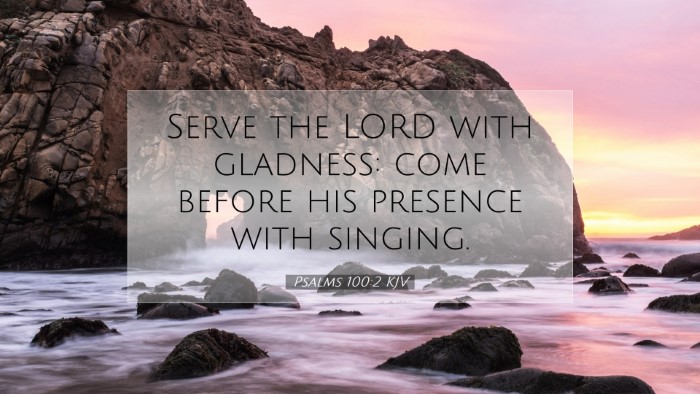Commentary on Psalms 100:2
Psalms 100:2: "Serve the Lord with gladness: come before his presence with singing."
Introduction
This verse calls the faithful to serve God joyfully, emphasizing the attitude of the heart in worship and service. Various commentaries provide insights into the significance of serving with gladness and the importance of worshiping God through singing.
Reflection on Service
Matthew Henry highlights the importance of the heart's attitude when serving the Lord. He asserts that true service is marked by gladness, suggesting that joy in our service reflects a right relationship with God. Additionally, Henry notes that serving God is not a burden but a privilege; thus, we should approach it with sincere gratitude.
Albert Barnes elaborates on the meaning of "serve" in this context, understanding it as a call to worship and devotion. He emphasizes that service rendered to God should be marked by enthusiasm and delight rather than obligation. Our expressions of service should stem from a recognition of God's worthiness and grace.
Adam Clarke includes the concept of "gladness" as an essential element of spiritual service. He interprets this gladness as a natural response to the grace and love we receive from God. Clarke encourages believers to reflect on the joy of salvation, suggesting that an authentically joyful service attracts others to the faith, thereby fulfilling the Great Commission.
The Call to Worship
The latter part of the verse, "come before his presence with singing," implies an invitation to worship that is both communal and individual. This encompasses the idea that worship is an act of coming into the presence of God with a heart full of praise.
Matthew Henry affirms the importance of singing as an expression of joy and reverence towards God. He argues that singing not only glorifies God but also establishes a sense of unity among believers. Moreover, he points to the biblical tradition of singing as an integral part of worship, tracing it back through the Psalms and to the practices of the early church.
Albert Barnes suggests that music is one of the most effective means of lifting the soul towards God. He states that singing can enhance our engagement with God, and when congregations come together to sing, it serves both as a personal and collective act of devotion. He encourages believers to make use of music as a powerful tool in expressing love for God and reinforcing community bonds.
Adam Clarke comments on the effect that singing has in communal worship settings. He posits that entering God's presence with singing promotes a vibrant atmosphere of praise and fosters an environment conducive to deeper spiritual encounters. Clarke further emphasizes that the scriptures frequently encourage singing as a form of worship, and this practice should be upheld in the lives of believers.
Spiritual Implications
This verse encapsulates profound theological implications about the nature of serving and worshiping God. It delineates a model of service: one that is cheerful and sincere, reflecting indwelling grace.
Matthew Henry's insights reveal that gladness not only honors God but transforms the servants into witnesses of God’s love. Serving with joy becomes a testimony of the inner change wrought by the Holy Spirit in a believer's life.
Albert Barnes expands on the notion of worship by illustrating that true worship rises from an understanding of who God is. Thus, service that begins with reverence and awe culminates in gladness, reinforcing the idea that knowledge of God stirs joy.
Adam Clarke captures the essence of community worship, where collective singing becomes a vehicle for expressing unified joy in God. He points out that such collective acts of worship serve not only as spiritual nourishment but also as a means of evangelism, as they create an inviting atmosphere for those seeking the truth of the Gospel.
Conclusion
Psalms 100:2 stands as a powerful reminder to the faithful of the joy and vibrancy that should characterize our worship and service to God. In the insights provided by Matthew Henry, Albert Barnes, and Adam Clarke, we find a comprehensive understanding of how service should be infused with gladness and how worship, especially through singing, draws us into the presence of God.
Pastors, students, theologians, and Bible scholars are encouraged to embrace this attitude of joy as they serve and worship. May our lives resonate with the gladness that comes from knowing and serving our Lord, and may our gatherings be filled with songs that declare His greatness and grace.


